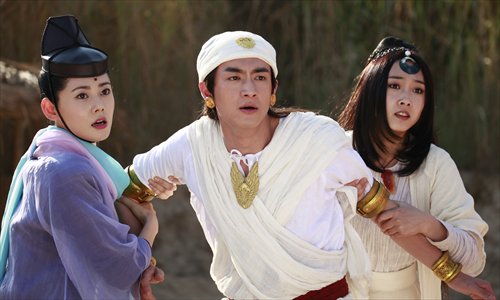Legendary Legend
By Xu Ming Source:Global Times Published: 2014-4-15 21:18:01

From Left: Choo Ja-hyun, Lin Gengxin and Xuan Lu perform in Legend of the Southwest Dance and Music Photo: IC
While South Korean drama You Who Came from the Star is still a sensation in China even though it ended over a month ago, a great number of fans of domestic TV drama Legend of the Southwest Dance and Music, which aired at almost the same time as The Star, are calling for the drama to receive the attention they feel it's due.First broadcast on CCTV at the end of 2013, the show was extremely well received at the time. Currently being rebroadcast on Yunnan TV, many netizens have lauded the Legend crew for their dedication to creating a quality domestic series. The show currently has an 8.7 on douban.com, a popular website similar to Rotten Tomatoes, a rare occurrence considering most domestic dramas hardly reach above 7. Meanwhile, comments on Sina Weibo and other media outlets have all given the program straight A's.
Legend has also seen positive feedback in South Korea since its broadcast on the REAL CHINA channel early this year.
Legend based on reality
Based on historical events that occurred in the Tang Dynasty (618-907), Legend brings to life the story of the attempt of the prince of Biao, today's Myanmar, to lead an orchestral group to pay tribute to the emperor in the Tang Dynasty capital of Chang'an and establish cultural communication with the Tang in spite of the numerous challenges he faces.
The prince and his retinue's long journey is like a reverse Journey to the West, in which the group has to travel an enormous distance eastward to reach Chang'an. Though a simple cultural event on the surface, the journey becomes a cluster of taut stories, involving plenty of schemes and secrets. Different forces try to hinder the journey for unspeakable purposes and various fights unfold along the way, even the prince's companions all have their secrets.
Legend seems like a shallow Chinese historical soap-opera when you look at its title, shining costumes and showy exterior shots that look like some form of scenic propaganda. However, "going deep into the show will reverse your first impression and in the end finally amaze you," many netizens exclaim.
Browse online and you'll have a hard time finding any negative comments about the drama. Some have even written that the show challenges their IQ in ways that usually only detective fiction has done. This is quite a step above most historical dramas that tend to belittle the audience's IQ with their pale imitation of a plot.
This praise isn't without merit. Directed by veteran actor Yu Rongguang, Legend boasts complicated plots, tight reasoning, superb acting and refined production. As the first domestic TV drama made in cooperation with Myanmar, the drama captures the real life locations along the group's journey from Myanmar, Ruili to Chang'an (now Xi'an), making the scenery in the drama itself a selling point.
The show is also regarded as respecting history. Jiang Xiaorong, producer of the drama, explained at a seminar that everything, from the selection of sets and costumes to the dances performed in the show, was finished with the help of local inheritors of Myanmar's intangible cultural heritage in an attempt to present an authentic look when it came to history and culture.
The problem with history
Although the drama is not without defect, this almost unanimous praise for a domestic TV drama, particularly a historical drama, is still rare. The last time we saw such a positive response was in 2011 when The Legend of Zhen Huan exploded across the Internet.
In recent years, the Internet has always seemed full of complaints and criticism whenever a historical drama comes out. In pursuit of high ratings, many of these dramas try to compete by using exaggerated costumes and make-up, and twisting history and classic stories into weak see-through plots in order to stimulate the audience's senses.
In addition to omnipresent love triangles and torturous romantic plots, some shows simply ignore historical fact when shooting, often reshuffling the order of space and time. Yang Guifei (Yang Yuhuan), a historical beauty famous for her plump body, turns into a slender woman, while glazed tiles that only became popular in the Yuan Dynasty (1279-1368) appear in a TV drama about the Tang Dynasty, just to name a few examples of historical inaccuracy.
Yuan Tengfei, a writer and history teacher, described the present quality of many historical dramas in China as "terrible."
"Some are simply not watchable," he remarked, picking out the inexact details in many supposedly "historic" dramas, according to a report on chinanews.com.
Meanwhile, in their efforts to compete for market share, production companies have flooded the domestic TV industry with repeated themes, endless remakes of classics and a lack of originality. Even though over 17,000 episodes are shot every year, only a few dramas actually stand out.
"The producers have to consider financial returns when shooting a TV drama, and quality production usually means high costs and risk. Some shows are written merely to satisfy the psychological needs of the audience in order to guarantee ratings," Hongsui, a cultural critic, told the Global Times.
In this sense, the good reputation Legend has earned for itself might serve as an example to drama producers at a time when the art of TV drama is being held at gunpoint by the market, noted Zeng Qingrui, vice president of the Beijing Art Critics' Association during a discussion about Legend last month.
Posted in: TV